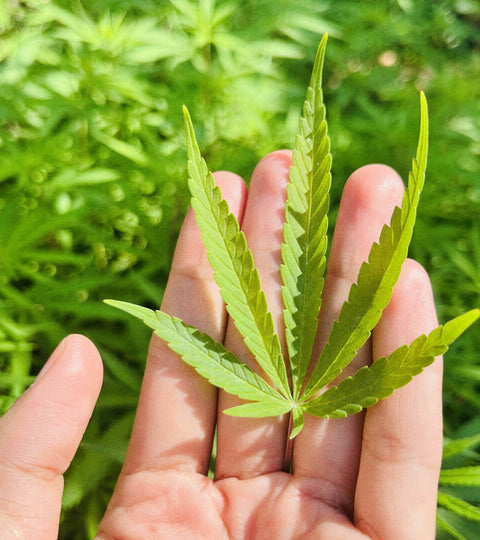CBD and THC: Understanding their Differences and Therapeutic Properties
Table of Contents
- Introduction
- CBD vs. THC: The Biochemical Divergence That Counts
- Methods of Consumption
- CBD vs THC: Weighing the Therapeutic Merits and Potential Risks
- The Road Ahead: A Clarion Call for More Comprehensive Trials
- Frequently Asked Questions (FAQs) About the Differences and Uses of CBD and THC
- What are CBD and THC?
- How do CBD and THC interact with the endocannabinoid system?
- What are the proposed health benefits of CBD and THC?
- How do CBD and THC work together?
- Are there any concerns or side effects of using CBD or THC?
- Is further research needed on CBD and THC?
- Is there a stigma associated with cannabis use?
- Conclusion
Introduction:
When it comes to cannabinoids in cannabis, CBD (Cannabidiol) and THC (Tetrahydrocannabinol) steal the limelight. But what sets them apart? How do their applications and benefits compare? And why should we care? Dive with us into the fascinating world of CBD, THC, and their promising therapeutic roles for diverse health issues.
Print View: Our CBD v. THC Print is a clean and modern infographic with a focus on two of the most helpful and studied cannabinoids. This art print indicates which medical symptoms usually respond best to CBD, THC, and from a combination of the two cannabinoids.
CBD vs. THC: The Biochemical Divergence That Counts
At first glance, you'd think the compounds responsible for the characteristic of the "high" effect you receive from cannabis are all alike. Yet, CBD and THC interact uniquely different with our CB1 receptors of the endocannabinoid system (ECS), a critical regulator of our mood, memory, appetite, and pain sensation.
While both compounds share an identical molecular structure, a minor structural variation sets them apart. THC contains a cyclic ring, enabling it to bind seamlessly to the CB1 receptors, thus eliciting the therapeutic effects. Conversely, a different group of compounds in CBD prevents this binding. This seemingly small distinction means CBD and THC engage with the ECS in vastly different ways.
In terms of consumption, cannabis offers an array of options ranging from edibles, topicals, vaping, tinctures, to conventional smoking. When hemp material is converted into a CBD distillate oil, companies have developed a spectrum of CBD products from capsules, patches, topicals, beverages, tinctures and many more.

CBD vs THC: Weighing the Therapeutic Merits and Potential Risks
Both CBD and THC have been lauded for their pain-relieving and anti-anxiety attributes. CBD oil, in particular, has shown promise in addressing conditions like arthritis, chronic pain, sleep disorders, and mental health issues. Meanwhile, a 2013 FDA-approved trial affirmed THC's pain-relief potential, with low doses significantly reducing pain intensity.
In the therapeutic realm, THC has displayed remarkable compatibility with chemotherapy, preventing cell death, impeding the division of mutated cells, and selectively targeting cancer cells. Remarkably, it has also shown encouraging results in young patients with leukemia and epilepsy, devoid of side effects.
CBD's full therapeutic potential, however, shines when combined with other cannabinoids, especially THC. As Dr. Jahan Marcu from Marcu & Aurora, suggests CBD could "enhance" THC by mitigating its intoxicating effects while retaining the pain-relief benefit and reducing specific side effects.
It's a common belief that CBD is non-psychoactive, but Dr. Marcu argues otherwise. Although CBD doesn't bind to either CB1 or CB2, it can prompt the body to produce its own cannabinoids or endocannabinoids. While CBD's effects are typically subtle, high doses can lead to alertness and potential intoxication.
The Road Ahead: A Clarion Call for More Comprehensive Trials
Historically, THC has commanded more attention than CBD. However, the increasing popularity of "Full-Spectrum" products, rich in CBD with less THC, underscores the urgency for more comprehensive, long-term research on CBD's effects on humans.
Despite the lingering stigma around cannabis use, Dr. Marcu emphasizes the need to view it like other plant-based medications, deserving more scientific scrutiny and governmental acceptance process.
Frequently Asked Questions (FAQ)
Q. What are CBD and THC?
CBD (Cannabidiol) and THC (Tetrahydrocannabinol) are two of the most common cannabinoids found in cannabis. Both interact with the endocannabinoid system (ECS) but in different ways due to their slightly different molecular structures.
Q. How do CBD and THC interact with the endocannabinoid system?
CBD and THC both engage with the CB1 receptors of the ECS, which regulates our mood, memory, appetite, and pain sensations. THC binds perfectly to these receptors due to its cyclic ring structure, causing you to feel its therapeutic effects. In contrast, CBD, with its different group of compounds, doesn't bind to these receptors, leading to different effects.
Q. What are the proposed health benefits of CBD and THC?
Both CBD and THC have been studied for their potential therapeutic effects. CBD oil has shown promise in treating conditions like arthritis, chronic pain, sleep disorders, and anxiety. On the other hand, low doses of THC have demonstrated significant pain-relief potential. THC also seems to work well with chemotherapy treatments, preventing cell death, inhibiting mutated cell division, and selectively targeting cancer cells.
Q. How do CBD and THC work together?
When combined, CBD is believed to "enhance" THC by reducing its intoxicating effects while maintaining the pain-relief benefit and mitigating certain side effects. This synergy is often used in "Full-Spectrum" cannabis products.
Q. Are there any concerns or side effects of using CBD or THC?
While CBD is typically associated with subtle effects, high doses can lead to alertness and potential intoxication. THC, known for its "high" effect, can cause feelings of euphoria, but it may also lead to side effects like dry mouth, memory loss, and coordination issues. It's crucial to consult with a healthcare professional before starting any new treatment.
Q. Is further research needed on CBD and THC?
Yes, despite the historical and increasing usage of CBD and THC, comprehensive long-term studies on their effects are still needed. This includes understanding their impact when used separately and in combination, as in "Full-Spectrum" products.
Q. Is there a stigma associated with cannabis use?
Yes, there is a historical stigma associated with cannabis use, often due to misconceptions and legal issues. However, attitudes are changing, with increasing recognition of cannabis's potential therapeutic effects and calls for it to be considered similarly to other plant-based medications.
Conclusion
In summary, CBD and THC interact differently with the human body via the ECS, underscoring the need for further research and controlled trials to fully elucidate their long-term impacts. The tale of CBD and THC is a testament to the wonders that nature's chemistry shares with us. Their individuality, their unity, and their profound effects weave a narrative that beckons researchers, practitioners, and individuals alike to embark on a collective journey toward enlightenment and optimal health. As time progresses, may these cannabinoids continue to be unraveled, understood, and embraced as partners in our pursuit of holistic well-being.
Quick Note: Dont forget to check out our CBD Jotter or our Patient Journal to help facilitate your journey through guided entry pages and graphics designed to help you document the flavors, effects, and potency of your cannabis or CBD experiences.



